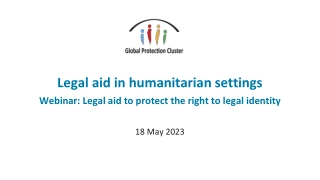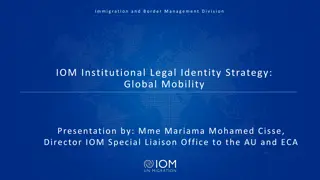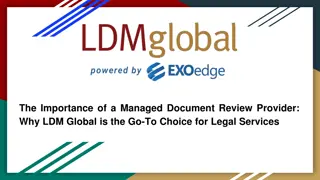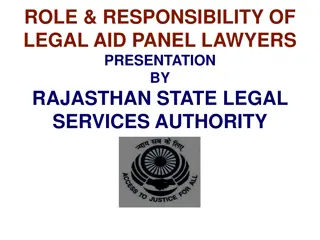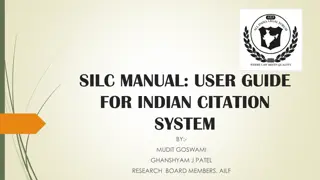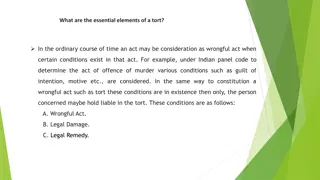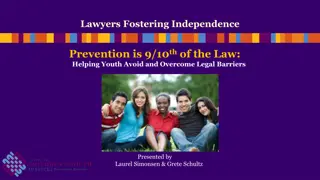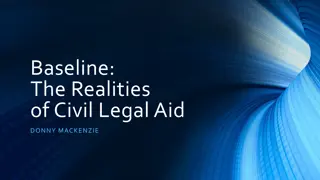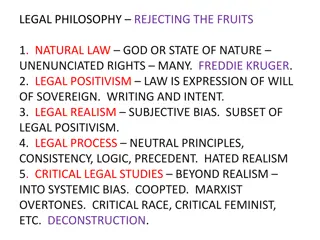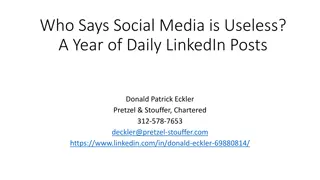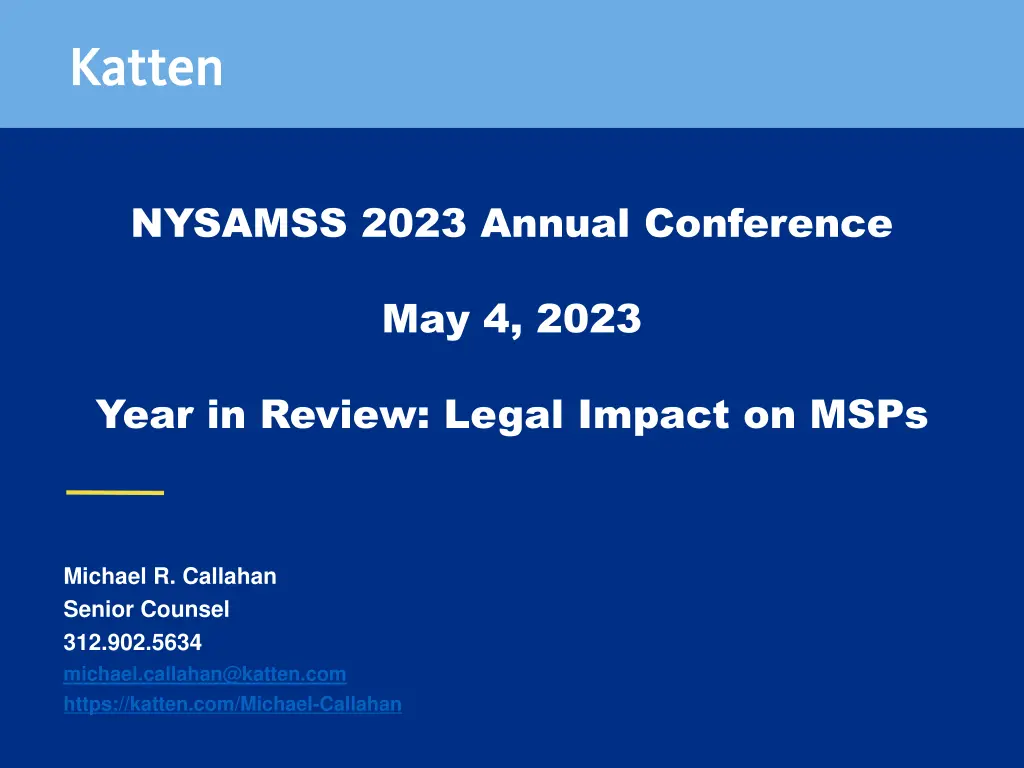
Legal Impact on MSPs: A Case Study in Patient Safety Privilege
Explore a legal case involving patient safety privilege under the Patient Safety and Quality Improvement Act. Discover how a hospital's Event Reporting System and Serious Event Reading Team meetings contributed to the protection of privileged patient safety work product. Learn about the court's decision and the implications for medical providers in maintaining confidentiality.
Download Presentation

Please find below an Image/Link to download the presentation.
The content on the website is provided AS IS for your information and personal use only. It may not be sold, licensed, or shared on other websites without obtaining consent from the author. If you encounter any issues during the download, it is possible that the publisher has removed the file from their server.
You are allowed to download the files provided on this website for personal or commercial use, subject to the condition that they are used lawfully. All files are the property of their respective owners.
The content on the website is provided AS IS for your information and personal use only. It may not be sold, licensed, or shared on other websites without obtaining consent from the author.
E N D
Presentation Transcript
NYSAMSS 2023 Annual Conference May 4, 2023 Year in Review: Legal Impact on MSPs Michael R. Callahan Senior Counsel 312.902.5634 michael.callahan@katten.com https://katten.com/Michael-Callahan
PEER REVIEW Katten Muchin Rosenman LLP | Confidential & Proprietary 2
Peer Review Doe v. Smith Hospital (Wisconsin 2021) Background Plaintiff in this case filed a lawsuit against a Wisconsin Hospital resulting from an injury on Hospital grounds. During discovery, Plaintiff requested all documents, communication or correspondence as it relates to [Hospital s] Serious Event Reading Team(s) ( SERT ) which were generated over a specified period of time. Plaintiff filed a Motion to Compel after the Hospital failed to produce any materials, arguing that they were protected or privileged from discovery under the Patient Safety and Quality Improvement Act of 2005 ( PSQIA ) and Wisconsin State Statute 146.38. The documents requested were narrowed down to the minutes of two SERT Committees. Katten Muchin Rosenman LLP | Confidential & Proprietary 3
Peer Review Through affidavits and the Hospital s Memorandum in Support of its Motion for a Protective Order, it established the following: The minutes were entered into the Hospital s Event Reporting System ( ERS ) and were discussed at the SERT meetings. SERT and ERS were both components of the Hospital s Patient Safety Evaluation System ( PSES ) policy, which describes the process of collecting, utilizing, sharing and reporting privileged patient safety work product ( PSWP ) or treating PSWP as deliberations or analysis ( D or A ). It was the Hospital s routine practice during the relevant time frame that Event Reports were prepared by and submitted to SERT for review and reported to the [Hospital s] Patient Safety Organization. The minutes were entered into the PSES and reported to the PSO. The minutes related to the medical care provided to the Plaintiff. Katten Muchin Rosenman LLP | Confidential & Proprietary 4
Peer Review Court s Decision The Court s determined that the minutes were assembled or developed by a provider for the purpose of reporting to a PSO and actually provided as demonstrated through the affidavits. The Court further held that the minutes are privileged because they identify the discussions and analyses conducted by SERT meetings. Having met the definition of PSWP under both the reporting and deliberations or analysis pathways, the minutes were therefore privileged from discovery under the PSQIA. The Court further ruled that the minutes were privileged under Wisconsin Statute Sections 146.38(1m) and 146.38(2m) which prohibits the disclosure of an incident or occurrence report in a civil proceeding against a medical provider. Because the minutes in dispute related to the plaintiff s medical care, they were not discoverable under this state statute. Katten Muchin Rosenman LLP | Confidential & Proprietary 5
Peer Review Leadbitter v. Keystone NCCF Consultants, Ltd., No. 19 WAP2020 (Penn. Sup. Ct., Aug. 17, 2021) Background This a medical malpractice case in which the plaintiff who after receiving spinal surgery, suffered a series of strokes resulting in numerous impairments including permanent brain damage. Plaintiff brought negligence claims against multiple defendants, as well as vicarious and corporate negligence allegations against the Hospital, arguing that its credentialing and privileging process was inadequate and that it should have known the physician lacked the expertise to be authorized to perform the spinal surgery in question. A discovery dispute ensued in which the Hospital refused to turn over certain information in the surgeon s credentials files, including an OPPE summary report, a professional peer review reference and competency evaluations prepared by physicians regarding the defendant surgeon s performance and three documents described as National Data Bank Practitioner Query Response. Katten Muchin Rosenman LLP | Confidential & Proprietary 6
Peer Review The Hospital also redacted from three documents information which the Hospital characterized as professional opinions regarding the physician s competence. The Peer Review Statute asserted by the Hospital was the Pennsylvia Peer Review Protection Act ( PRPA ). Relying on a prior decision by the Pennsylvania Supreme Court in Reginelli, which held that a credential review file versus a peer review file is not protected by the PRPA, the trial required the Hospital to disclose the information. In addition, it argued that the NPDB information also was not privileged. On appeal, the Superior Court affirmed the decision in holding that a credentials committee was an unprotected review organization versus a review committee as determined in the Reginelli decision. The Reginelli has long been criticized as not providing an accurate interpretation of the legislative intent governing the protection of information that qualifies as peer review whether in a credentials file or in other files. Katten Muchin Rosenman LLP | Confidential & Proprietary 7
Peer Review Court s Decision After a long, reflective and detailed analysis, the Supreme Court finally recognized and agreed with the Hospital s position that a committee which performs a peer review function, although it may not be specifically and entirely peer review committee, constitutes a review committee whose proceedings and records are protected under the PRPA. With respect to Data Bank Reports, the Court held that: the HCQIA and its regulations treat as privileged the information the NPDB provides to Hospitals in response to requests concerning a specific practitioner. This privilege, moreover, exists regardless of any aspect of state law to the contrary. Shands Teaching Hospital and Clinics, Inc. v. Beylott, No. 1D22-1277, Florida First District Court of Appeal (March 8, 2023) Background The plaintiff in this negligence suit against the hospital was visiting a patient when she slipped and fell on some clear liquid while walking through a hallway. Katten Muchin Rosenman LLP | Confidential & Proprietary 8
Peer Review As part of her lawsuit seeking damages from her injury, she sought to discover an investigation report that was prepared by the hospital as a result of her fall. In response to a motion to compel disclosure, the hospital argued that the report was placed in the hospital s patient safety evaluation system (PSES), and prepared solely for submission to [a] patient safety organization and was in fact submitted. Therefore, according to the hospital, the report was privileged and not discoverable under the Patient Safety and Quality Improvement Act of 2005 (PSQIA). The trial court granted the plaintiff s motion ruling that the PSQIA only applies to patients and not incidents involving staff or visitors. The Appellate Court s Decision The Appellate Court reversed on appeal relying on an uncontradicted affidavit from the hospital certifying that the subject report was assembled for reporting to a patient safety organization under the Act, and that the report was in fact submitted utilizing the confidential reporting pathway as set forth under the PSQIA. Katten Muchin Rosenman LLP | Confidential & Proprietary 9
Peer Review The Court also agreed with the hospital s argument that efforts to improve conditions which can cause slip and fall injuries meets their requirement under the PSQIA, that the report could result in improved patient safety, health care quality, or health care outcomes. Because the safety efforts apply to all person s including patients, visitors and employees, the Court stated that it did not matter that the plaintiff was not a patient at the time. The Appellate Court therefore held that the disputed report was privileged and not subject to discovery under the PSQIA. Lessons Learned It is important to understand the exact language of any state peer review privilege so that when asserting the privilege, you identify what elements have to be in the statute and the PSQIA in order to prevent discovery. It is not enough to understand and know the statutory language. You must also be familiar with case law which interprets the statute which may be at variance with the actual statutory language. Katten Muchin Rosenman LLP | Confidential & Proprietary 10
Peer Review The state privilege is only going to apply when the minutes and the analyses truly involve peer review activities which, in most states, have to be generated by a peer review committee which meets the statutory definition. It is critical that defense attorneys in any federal or state civil or criminal proceeding or agency investigation have a clear understanding of the PSQIA and state peer review statutes when challenging discovery requests for information which is privileged under these laws. When defense attorneys are not familiar with the PSQIA and the court decisions interpreting the scope of protections, providers should consider teaming up with outside attorneys experienced in this area. The use and introduction into evidence of a detailed affidavit(s), which include representations similar to the affidavit in the Shands and Doe cases, along with the applicable PSES and peer review policies, is a legal imperative if hoping to defend against discovery demands for privileged information. Katten Muchin Rosenman LLP | Confidential & Proprietary 11
Peer Review The privilege protections under the PSQIA and state laws can both apply depending on the respective laws and how they are being interpreted. There are now a number of court decisions holding that these statutes are not mutually exclusive. The Courts are not familiar with these procedures and generally do not support peer review privileges unless the Hospital has satisfied its burden of proof. The decisions of a trial or a appellate Court, and even a supreme in one state, are not binding in other Courts in different jurisdictions. That said, the decisions can be instructive given the fact that the language in various states peer review privilege statutes are very familiar. Keep in mind that if a Hospital participates in a Patient Safety Organization, with the privilege protections under the Patient s Safety and Quality Improvement Act of 2005 are broader than the state statues, and also apply in all state and federal proceedings. Katten Muchin Rosenman LLP | Confidential & Proprietary 12
Peer Review Therefore you need to know whether your activities as a MSP and the information you have access to are protected under both state law and the Patient Safety Act. Such knowledge may affect how you handle these materials. It is also important for an MSP whose Hospital is in the PSO to be familiar with the Hospital s Patient Safety and Evaluation System ( PSES ) policies which specifically describe how privileged information is collected, utilized, reported to a PSO and/or treated as privileged deliberations or analysis. Katten Muchin Rosenman LLP | Confidential & Proprietary 13
EMPLOYMENT DISPUTES Katten Muchin Rosenman LLP | Confidential & Proprietary 14
Employment Disputes Jordan v. Eastern Maine Medical Center, No. 1:21-cv-00034-NT, (U.S. Dist. Ct., v. Maine (December 2021) Background Plaintiff is a pediatric dentist who joined the Medical Staff of the Hospital in June, 2013, specializing in surgical pediatric dentistry work. In May, 2016, one of the other pediatric dentists expressed concern about the quality of the plaintiff s other patient care to the Chief of Surgery which subsequently recommended a peer review be conducted regarding the plaintiff s cases. A review of four cases generated significant concerns about the quality of plaintiff s patient care which then led to an external peer review. The external peer review of 15 cases led to a recommendation by the Medical Executive Committee to suspend the physician s privileges pending further consideration by the MEC. Katten Muchin Rosenman LLP | Confidential & Proprietary 15
Employment Disputes Plaintiff was notified of the external peer review report and the summary suspension. The MEC also requested an investigation into plaintiff s qualifications and privileges through the appointment of an ad hoc investigation committee. After reviewing the conclusions of the peer review process and interviewing the plaintiff, the committee unanimously voted to continue the summary suspension, concluding that the cases revealed issues of significant clinical concern that were rampant throughout all of the cases reviewed. The committee s additional recommendation that the plaintiff s membership and privileges be revoked was upheld by the MEC which also recommended to the Hospital s Board of Trustees that the plaintiff s Medical Staff privileges be revoked. Plaintiff was informed of the MEC s decision and of his right to a hearing. Plaintiff did not request a hearing leading to the Board s decision to revoke plaintiff s privileges. Katten Muchin Rosenman LLP | Confidential & Proprietary 16
Employment Disputes On the day the MEC voted to continue the summary suspension, he was reported to the National Practitioner Data Bank and to the Maine Board of Dental Practice. The Data Bank report was later supplemented to reflect the decision to terminate the plaintiff s privileges. Plaintiff filed a lawsuit in state Court alleging (1) an abuse of the peer review process, (2) violation of the Whistleblower Protection Act and, (3) and defamation. Court s Decision The Court rejected plaintiff s argument that the Hospital violated the Due Process Clause of the 14thAmendment because the Hospital was a private entity and was not performing any government function. Consequently, the Due Process Clause did not apply. The Court, however, recognized that a cause of action and procedural protections can arise in the event that a physician violates an Employment Agreement or the Bylaws under a breach of contract theory. Katten Muchin Rosenman LLP | Confidential & Proprietary 17
Employment Disputes In reviewing the Court record, the Court determined that the plaintiff was informed of the investigation as to whether there would be a need for corrective action, was provided a copy of the bylaws and the medical records which were reviewed both as part of the internal and external peer review, was provided with other information that the plaintiff requested and was interviewed by the committee. Although the initial review was not rescheduled to accommodate the plaintiff, there was no obligation that it be rescheduled. Plaintiff did not deny that he received notice of the peer review actions and that he opted not to request a hearing. Therefore the Court concluded that there was no evidence provided by the plaintiff that he did not receive any of the protections entitled under the bylaws or any other contract. With respect to the claim under the Whistleblower Protection Act, plaintiff did not timely file a charge with the Maine Human Rights Commission within the required timeframe, nor did he establish or submit any evidence to support an exception to this filing requirement. Therefore the claim was dismissed. Katten Muchin Rosenman LLP | Confidential & Proprietary 18
Employment Disputes Similarly, the Court dismissed the defendant s claim that false reports were submitted to the NPDB and to the Maine Board of Dental Practice because he did not file a claim within the two-year statute of limitations. Shahbabian v. Trihealth, Inc., No. 1:18-cv-790 (S.D. Ohio, July 22, 2021). Background Plaintiff in this case was a sole practitioner and neurosurgeon with hospital privileges. Despite having a number of quality review investigations he signed a five-year employment agreement with the Hospital in which his annual income for completing a specified number of Relative Value Units was $968,000 dollars. Because of continued quality of care concerns, the surgeon was placed under a plan of correction which limited his daily surgical block to six hours as well as other changes. Over the next few years, he suffered some health setbacks but continued to see patients. Katten Muchin Rosenman LLP | Confidential & Proprietary 19
Employment Disputes Towards the end of the five-year agreement. The parties were unable to sign a new employment agreement and his contract therefore was not renewed. Because the surgeon had not met his actual productivity requirements, they notified him that he was overpaid in the amount of $680,000 dollars. The surgeon sued the Hospital alleging breach of contract, common law, fraud, and several claims of age discrimination, disability discrimination and retaliation. The surgeon also served the Field Clinic which had a contract with the Hospital to oversee the quality of his patient care, arguing that the Clinic had engaged in tortious interference with his contract and with prospective business arrangements. Katten Muchin Rosenman LLP | Confidential & Proprietary 20
Employment Disputes Court s Decision The Hospital and the Clinic argued that the activities complained of by the surgeon were protected under the Ohio state peer review immunity provisions. In reviewing the claims identified above, the Court determined that all of these actions fell within the scope of the functions of the Peer Review Committee and therefore agreed with the Hospital s immunity arguments. In response to the surgeon s discrimination claims, the Court ruled that he was unable to show that his age of 70 was the cause for alleged adverse actions or that the Hospital s reasons for reducing its workload were a pretext for discrimination. In addition, the Court ordered the surgeon to repay the overpayment of $680,000 dollars, rejecting his argument that the contract was illegal because it violated the anti-kickback statute. Katten Muchin Rosenman LLP | Confidential & Proprietary 21
Employment Disputes Denman v. St. Vincent Medical Group and St. Vincent Carmel Hospital 20, APL-1236 (Aug 18, 2021) Background Plaintiff in this case is a female OBGYN who was employed by the St. Vincent Medical Group ( SVMG ) and had Medical Staff membership and clinical privileges at St. Vincent Hospital. In December of 2017, while Dr. Denman was on call, she was requested to come to the Hospital to check on patient who was in labor. After a nurse stated that the Plaintiff could go to dinner and then check back with the patient, she later received a text from one of her partners about having to evaluate this patient on behalf of the Plaintiff. Confused by the miscommunication, she went to the Hospital and spoke directly with the nurses expressing her anger, particularly at the new nurse with whom she had the prior discussion. Katten Muchin Rosenman LLP | Confidential & Proprietary 22
Employment Disputes One of the nurses named Thornton followed Denman into the patient s room. Thornton believed that she smelled alcohol on Denman's breath but waited 24 hours to report this her superior even though the Hospital policy is that she report her concerns immediately so that a blood and or urine test can be conducted to determine the physician s alcohol levels. Under the Medical Staff Bylaws and Policies, a peer review committee was supposed to have been convened and trigger an investigation into the possibility that the physician was impaired. This required process was never followed. After some internal discussions the physician met with the chief medical officer of the Hospital who determined that she was required to be assessed, evaluated and ultimately participate in the Indiana State Medical Association's Physicians Assistant program. Katten Muchin Rosenman LLP | Confidential & Proprietary 23
Employment Disputes The physician only agreed to participate on the belief that the matter had been through the peer review process and that she had no choice. Had she refused she was going to be subjected to disciplinary action. The Hospital conveyed this information also to the CMO of the SVMG. After being assessed, which included a third party evaluation, she was obligated to participate in six weeks of inpatient treatment, participation in an intensive five year alcohol monitoring program and other restrictions. These restrictions included required breathalyzer tests several times a day, a random urine screening, group and individual therapy meetings. In addition, Denman was not permitted to drink alcohol during the five year monitoring period. Denman filed suit within a few months of returning to work claiming defamation against Thornton and the Hospital, tortious interference with contract against the Hospital, tortious interference with employment relationship against the Hospital, fraud, constructive fraud and negligent misrepresentation against SVMG and civil conspiracy against the defendants. Katten Muchin Rosenman LLP | Confidential & Proprietary 24
Employment Disputes After hearing all of the testimony and evidence, the jury awarded Dr. Denman $4.75 million. Court s Decision On appeal, the Hospital argued that it should have received a directed verdict in its favor on the issue of defamation. The Appellate Court determined that there was evidence that would allow reasonable people to differ on whether the privilege had been abused. Therefore, we find no error with the Trial Court s denial of a directive verdict on the defamation claim. Regarding the Trial Court s denial of a directive verdict on the fraud/constructive fraud/negligent representation claims as to whether a peer review had occurred and had been misrepresented by SVMG, the Court found that there was sufficient evidence to support their claims and therefore denied the motion. Katten Muchin Rosenman LLP | Confidential & Proprietary 25
Employment Disputes Lessons Learned Because hospitals are employing more physicians, it is important that MSPs become more familiar with employment principles and agreements and how they affect your credentialing/privileging/peer review and related responsibilities. You should request a copy of a standard physician/APN employment agreement and determine the following: Are they being credentialed/privileged consistent with the Bylaws? Does the established peer review processes and policies apply the same way as for independent practitioners? Are they entitled to the same hearing and appeals rights? In most employment agreements there is a clean sweep provision meaning they agree to waive any hearing rights. Can they be terminated/suspended with or without cause? If terminated at the hospital, are they terminated at other affiliated entities and managed care contract participation? Katten Muchin Rosenman LLP | Confidential & Proprietary 26
Employment Disputes Remember that the hospital does not have to report a terminated employed physician to the Data Bank if they are entitled to hearing and appeal rights. Make sure that privileged information is NOT placed in an employed physician s/APN s employment file. Although HR can review privileged information if necessary, they need to create different, non-privileged documents for the file. Where possible, employed physicians should not be placed on hearing committees so as to avoid conflict of interest allegations made by the disciplined physician. Katten Muchin Rosenman LLP | Confidential & Proprietary 27
DATA BANK Katten Muchin Rosenman LLP | Confidential & Proprietary 28
Data Bank Bonzani vs. Goshen Health System, No.3:19-CV-586 (DRL-NGG) N.D. Ind. March 10, 2022 Background Dr. Bonzani entered into an employment agreement with Goshen Health as a urologist practitioner at Goshen Hospital. Ten months later, a patient died from complications from surgery, at which point the CMO suspended Bonzani s surgical privileges. The MEC formed an investigation committee to commence the peer review process, with which Bonzani complied, including his provision of operative logs, board certification and recommendation letters. An outside peer review report was challenged by Bonzani, which the investigative committee agreed and therefore ordered a new peer review report. While the second review report was underway, Bonzani appeared before a hearing committee to discuss the patient death case. Katten Muchin Rosenman LLP | Confidential & Proprietary 29
Data Bank Bonzani was exonerated and the hearing committee recommended that the MEC lift the precautionary suspension. The MEC thereafter received a second peer review report, also critical of Bonzani. Before a final hearing commenced, Goshen Health provided the second peer review report to Bonzani and told him that he could either voluntarily leave with severance pay or involuntarily leave without severance pay. He ultimately signed a separation agreement from Goshen Health which later filed a Data Bank report relating to his employment and termination. The separation agreement made no mention that the Hospital intended to file a report. Bonzani claimed that the Data Bank report contained false and misleading statements which led to the submission of his own statement with objections. Katten Muchin Rosenman LLP | Confidential & Proprietary 30
Data Bank Bonzani then filed a multi-claim lawsuit against Goshen Health and Goshen Hospital. Regarding the breach of contract claim, Bonzani argued that the Data Bank report violated the confidentiality and non-disparagement provisions in the separation agreement in that the Hospital did not submit a timely report and that it contained disparaging, misleading and factually inaccurate statements. In response, Goshen only argued that the Data Bank legislation provided an immunity unless the Hospital which submitted the report has actual knowledge of the falsity of the information contained in the report. Bonzani also argued that the report was misleading because it omitted the fact that the hearing committee found in his favor and implies the investigation was unfavorable to him. Katten Muchin Rosenman LLP | Confidential & Proprietary 31
Data Bank Bonzani also argues that the Hospital breached its bylaws, which Indiana considers to be a contractual agreement, by refusing to give him an expedited hearing, unilaterally ordering a second peer report and by broadening the reason for his suspension to include his entire operative history without affording him the opportunity to be heard on his entire history. In response to claims of common law disparagement and defamation, the Hospital argued that it was entitled to a qualified privilege because the communications were made pursuant to legal duty and in good faith to another party with a corresponding interest and duty. Court s Decision In a motion to dismiss, the Court must accept as true factual allegations asserted in the legal complaint. At this stage of the proceedings, discovery had not significantly taken place in order to determine whether the resulting facts and evidence support each of Bonzani s legal claims. Katten Muchin Rosenman LLP | Confidential & Proprietary 32
Data Bank With respect to these legal complaints, Bonzani had alleged sufficient facts to support the claims. Hospital s motions to dismiss were denied in addition to the fact that for some of them, the Hospital did not provide any responses on which the Court could better assess the claims. Owens v. The Oregon Clinic, P.C., No: 3:22-cv-488-SI. (D.Or. August 29, 2022) Background Dr. Owens is a gastroenterologist who had been employed by The Oregon Clinic (TOC) and had privileges at Provident St. Vincent Medical Center (MC). Dr. Owens developed a method of patient charting in which he entered pre-charting notes and information about patients before providing services to them as well as representing that the patient had provided an informed consent. Katten Muchin Rosenman LLP | Confidential & Proprietary 33
Data Bank On at least two occasions, he formalized notes for patients who he had not seen or treated which therefore could have been relied on by other or subsequent providers. Two providers reported these incidents to the MC which triggered an investigation by the Chief of Medicine and the MEC in accordance with hospital policies. The Chief of Medicine sent Dr. Owens an email that a meeting was scheduled to discuss these issues. Because of his delayed response, the matter was referred to the MEC. Two days later, Dr. Owens and TOC sent a separation agreement stating the Dr. Owens would not provide services to the MC for two years. Because he was no longer employed by TOC, he was given the option to either take inactive status, which would pause his privileges indefinitely, but continue the investigation along with Dr. Owens corporation with the MEC, or to surrender his privileges and resign from the medical staff. Katten Muchin Rosenman LLP | Confidential & Proprietary 34
Data Bank He was further informed that if chose to resign, it would require the MC to report him to the Data Bank because he was under investigation at the time. Owens rejected the contention that he was under investigation and instead argued that he resigned his privileges in order to satisfy a non- compete clause in his separate agreement with TOC. Owens made two arguments to claim that he was not under investigation. First, HCQIA requires adequate notice in hearing procedures before an investigation may be commenced, and The MC s Professional Staff Policies and Procedures similarly require notice in appropriate procedures before an investigation may be commenced, but none were given under either claimed requirements. Katten Muchin Rosenman LLP | Confidential & Proprietary 35
Data Bank Court s Decision In response to the HCQIA argument, the Court stated that the notice and hearing requirements only apply when a professional review action, i.e., a disciplinary action was taken. Here, there was no such action. Instead, a professional review activity in the form of an investigation was initiated. Investigations themselves are not reportable, although they could lead to a professional review action. Here, Owens simply resigned during an investigation. In response to the Policy and Procedures argument, the Court pointed out that under these materials, the medical staff could trigger either a focus review or an investigation, the two are not the same. Although there were other provisions which did require that a physician be given notice where a committee was formally appointed to investigate, Dr. Owens resignation preempted continuation of this process under the Policies, and therefore, the notice requirement did not apply. Katten Muchin Rosenman LLP | Confidential & Proprietary 36
Data Bank Importantly, the Court pointed out that the NPDB Guidebook specifically states that bylaws are not controlling over the question of whether an investigation has been initiated. Even if not formally initiated under the bylaws, the Data Bank can conclude that an investigation was in fact triggered based on the facts and circumstances of the activities which took place. Lessons Learned It is important that MSPs learn what types of actions are and are not reportable to the Data Bank. These include the following: Involuntary restrictions of Medical Staff membership and/or clinical privileges including reductions, suspensions and terminations; Restrictions on the ability to practice beyond 30 days; Mandatory proctoring requiring the physical presence of a proctor before a physician can exercise privileges which remains in effect for longer than 30 days; Katten Muchin Rosenman LLP | Confidential & Proprietary 37
Data Bank Resignations while under investigation; Resignation in order to avoid an investigation or corrective action; Mandatory consultations requiring prior approval. Data Bank reports should be submitted in a timely fashion. HHS does not involve itself in the merits of the basis of the report. Their authority is limited to making sure that the report is factually accurate and that a report is required. Data Bank reports have to be specific enough so that one is able to understand the basis of the report. You need not spell out all of the gory details . The term investigation should be defined in your Medical Staff bylaws so as to establish a bright line test as to when an investigation is triggered. Katten Muchin Rosenman LLP | Confidential & Proprietary 38
Data Bank An example bylaw provision would be as follows: The term investigation , for Data Bank reporting purposes, shall refer to the decision made by the Medical Executive Committee under Article __, Section __ of these Bylaws in response to request for a formal (corrective) (disciplinary) (remedial) action under Article ___, Section ___ to initiate an investigation and for reviewing the request and any supporting materials. All other remedial measures, including but not limited to collegial intervention, monitoring, re- education and FPPE plans shall be considered routine Peer Review activities. Other than this defined term, you should avoid using the term investigation in other sections of the bylaws, policies and rules and regulations so as not to cause further confusion or inappropriate Data Bank reports. Make sure you consult with in-house or legal counsel before determining whether a Data Bank report is required. Katten Muchin Rosenman LLP | Confidential & Proprietary 39
HCQIA IMMUNITY Katten Muchin Rosenman LLP | Confidential & Proprietary 40
HCQIA Immunity Apuri vs. Parkview Health System, Inc., No. 21A-PL-591 (Ind. Ct. App. Feb 21, 2022) Background During the years 2012 through October 15, 2014, numerous complaints have been raised against Dr. Apuri including the following: Failure to respond to pagers and phone calls Failure to round on patients Poor communications with nursing staff Failure to complete admission orders, transfers, or discharge summaries on time Failing to respond to pages, phone calls or nursing inquiries Failing to notify patients or Hospital staff of imminent medical procedures Failing to apply certain medical devices during procedures Katten Muchin Rosenman LLP | Confidential & Proprietary 41
HCQIA Immunity Efforts at collegial intervention were initiated but the problems continued to arise, and he was initially placed on 100% chart review. In July 2013, after the Medical Staff investigated Dr. Apuri s practice, an Inquiry Body recommended: Dr. Apuri must submit to mental and physical evaluation to help improve practice management and personal accountability 100% chart review must be continued and non-compliance taken seriously. Failure to comply could lead to revocation of his Hospital privileges. In 2014, the Hospital s Quality Department documented at least 14 more instances where Dr. Apuri failed to round on his patients and communicate properly. On October 15, 2014, the MEC decided not to renew Dr. Apuri s Hospital privileges. An Ad hoc Committee met and concluded that Dr. Apuri s professional and clinical judgment. . . put patients at risk and was below Parkview Hospital standards. Katten Muchin Rosenman LLP | Confidential & Proprietary 42
HCQIA Immunity Although the Committee was concerned about the drastic recommendation to deny his privileges it was pointed out they had given two years worth of chances to correct his professional conduct issues, but he refused to do so and likely would continue to fail in the future, thereby putting patients at risk. The Board of Directors upheld the recommendation to terminate privileges. Dr. Apuri filed a complaint in state Court alleging: Breach of contract Intentional interference with a business relationship. Intentional interference with a contract. Trial Court determined that defendants were immune under HCQIA and therefore were entitled to a judgment as a matter of law. Katten Muchin Rosenman LLP | Confidential & Proprietary 43
HCQIA Immunity Court s Decision Dr. Apuri appealed. The Court went through a detailed discussion of the various provisions of HCQIA relating to peer review actions, procedural steps the Hospital must take to conduct its investigation and review including the adequate notice and hearing procedures. Regarding Dr. Apuri s claim that he did not receive adequate notice and the hearing procedures were not satisfied, he stated he did not receive certain documents including certain nursing staff communication records, other cardiologist s patient charts, and the panel member s employment contracts. The Court noted, however, that he never fully explained what was and wasn t made available to him, and in fact some documents were made available to him during the course of litigation. He further failed to identify how the information was relevant because no such determination was made by the hearing officer as required under HCQIA. Katten Muchin Rosenman LLP | Confidential & Proprietary 44
HCQIA Immunity The Court also noted that he failed to identify how he was prejudiced by not receiving this information. Moreover, access to other cardiologists patient charts would not be relevant and were immaterial because the focus was on other matters. This information is generally viewed as confidential. Apuri further argued that the hearing panel members were prejudiced because they were economic competitors. The Court determined, however, that none of the three members that were cardiologists and the fact that they were employees of the Hospital s physician group which might receive additional referrals upon termination of Apuri s clinical privileges was at most indirect competition and not direct competition as prohibited under HCQIA. Finally, regarding his claim that the peer review process was procedurally unfair because the Ad Hoc Committee s report and recommendation was untimely under the Bylaws did not deprive him of adequate notice and fair hearing procedures. The Court therefore affirmed dismissal of the lawsuit based on the HCQIA immunity provisions. Katten Muchin Rosenman LLP | Confidential & Proprietary 45
HCQIA Immunity Ranalingan vs. Robert Packer Hospital, No. 4:17-CV-00216 (N.D. Pa. Oct 13, 2021). Background The plaintiff in this case was a general surgery resident at Robert Packer Hospital who was trained in India. To become board certified in the United States, he needed to complete a general surgery residency. The American Board of Surgery ( ABS ) and the Accreditation Council for Graduate Medical Education ( ACGME ) needed to provide approval of their requests to enter the Hospital s five year residency program as a 4th year resident. Defendant, Dr. VanderMeer, the director of the residency program, advised the plaintiff to apply for post-residency fellowship that would commence three months before his scheduled graduation date. VanderMeer contacted the ABS and requested that he be allowed to graduate early which was approved. Katten Muchin Rosenman LLP | Confidential & Proprietary 46
HCQIA Immunity VanderMeer also was supposed to contact the ACGME to see if they would waive the 750 procedure requirement a link of their residency, but failed to do so on a timely basis. Thinking that he would graduate in June of 2015, the plaintiff applied and was accepted into a program at Dalhousie University in Nova Scotia, Canada. However, in March of 2015, the Hospital s resident promotion committee decided that the plaintiff was not prepared to graduate based on his being unable to complete the 750 procedure requirement as well as a number of rotations. The plaintiff contacted the director of the fellowship program and was able to arrange a later start date. VanderMeer also decided to contact the fellowship director explained that the plaintiff would not graduate in time to start the fellowship in July 2015, because he did not meet the minimum case volume. As a result, the fellowship offer was withdrawn. Katten Muchin Rosenman LLP | Confidential & Proprietary 47
HCQIA Immunity Also argued that it was immune under HCQIA and because its decision was based on the plaintiff s lack of competence or professional conduct as a basis for not allowing him to graduate early. Moreover, they argue that the plaintiff must submit expert testimony to show that the committee s decision was not a protected professional review action or that the decision was not fair. In response to the committee s rationale about purported technical shortcomings and misdiagnosis of the case, the plaintiff argued that the decision was based on manipulated information and reviews and that the committee was trying to protect VanderMeer and the general surgery from an ACGME red flag . If the jury could find that the committee s decision was based primarily on something besides his professional conduct, or that the decision was unreasonable because it was tainted with false reports, the HCQIA immunity protections would not apply. Katten Muchin Rosenman LLP | Confidential & Proprietary 48
HCQIA Immunity Court s Decision The Court had previously denied the Hospital s motion for summary judgment and was now ruling on efforts to limit the plaintiff s claim for various damages resulting from their alleged improper conduct. The Hospital and the defendants made these arguments in order to limit the issues that were to be presented before the jury. The Court determined that the plaintiff had made sufficient allegations and present sufficient evidence that support the Court s decision to not limit these claims and to send the matter instead to the jury for a decision. Therefore, the Hospital s various motions to limit such arguments were denied. Lessons Learned MSP s should understand the requirements are under HCQIA as well as the state Immunity statute in order to claim immunity protections under both laws. Katten Muchin Rosenman LLP | Confidential & Proprietary 49
HCQIA Immunity Medical Staff Bylaws and peer review policies need to be structured in order to take advantage of the protections under the state and federal laws. Failure to abide by Medical Staff Bylaws, peer review policies, rules and regulations, will undermine efforts to a claim and obtain immunity privilege protections. Most states have adopted HCQIA immunity provisions for privilege protection in addition to the state immunity provisions. If possible, do not include employed physicians on the hearing committees. The credentials/privileging quality files of other practitioners should not be accessed or utilized in these hearings. Keep in mind that immunity provisions under state and federal laws are not mutually exclusive. Meaning both immunity protections can be asserted depending upon the circumstances of the disciplinary decision. Katten Muchin Rosenman LLP | Confidential & Proprietary 50

